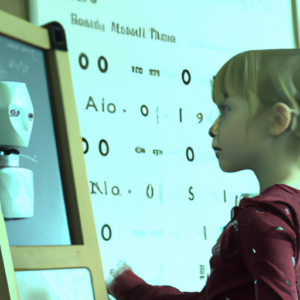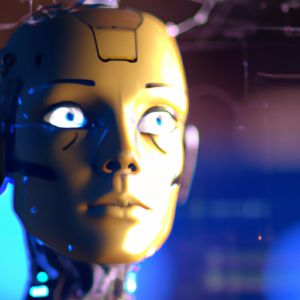AI in gaming will change the way we play

person gaming with headset and robotic sleeve
How AI is Revolutionizing the Gaming Industry
The gaming industry has seen a revolution in recent years, with the introduction of artificial intelligence (AI). AI has been used to create more immersive and realistic gaming experiences, as well as to improve the overall gaming experience. AI has been used to create more intelligent and adaptive game characters, as well as to create more realistic and dynamic environments. AI has also been used to create more sophisticated game mechanics, such as the ability to learn from the player’s actions and adjust the game accordingly.
AI has been used to create more realistic and dynamic game environments. AI can be used to create more realistic and dynamic environments by using algorithms to generate terrain, objects, and other elements of the game. AI can also be used to create more realistic and dynamic weather and lighting effects. AI can also be used to create more realistic and dynamic physics, such as the ability to simulate the effects of gravity, wind, and other forces on objects in the game.
AI has also been used to create more intelligent and adaptive game characters. AI can be used to create more intelligent and adaptive game characters by using algorithms to generate behaviors and reactions based on the player’s actions. AI can also be used to create more realistic and dynamic conversations between characters in the game. AI can also be used to create more sophisticated game mechanics, such as the ability to learn from the player’s actions and adjust the game accordingly.
AI has also been used to create more sophisticated game mechanics. AI can be used to create more sophisticated game mechanics by using algorithms to generate complex game rules and objectives. AI can also be used to create more sophisticated game mechanics, such as the ability to learn from the player’s actions and adjust the game accordingly. AI can also be used to create more sophisticated game mechanics, such as the ability to generate more realistic and dynamic environments.
AI has revolutionized the gaming industry by creating more immersive and realistic gaming experiences. AI has been used to create more intelligent and adaptive game characters, as well as to create more realistic and dynamic environments. AI has also been used to create more sophisticated game mechanics, such as the ability to learn from the player’s actions and adjust the game accordingly. AI has also been used to create more sophisticated game mechanics, such as the ability to generate more realistic and dynamic environments. AI has revolutionized the gaming industry and has made gaming more enjoyable and immersive than ever before.
Exploring the Benefits of AI-Powered Games
The use of artificial intelligence (AI) in gaming has become increasingly popular in recent years. AI-powered games offer a range of benefits that can enhance the gaming experience for players. From improved graphics and more realistic gameplay to increased levels of difficulty and more engaging storylines, AI-powered games can provide an immersive and enjoyable gaming experience.
One of the most notable benefits of AI-powered games is improved graphics. AI algorithms can be used to generate more realistic and detailed visuals, allowing players to experience a more immersive gaming experience. AI can also be used to create more realistic environments, allowing players to explore and interact with their surroundings in a more realistic way.
AI-powered games can also provide a more challenging gaming experience. AI algorithms can be used to create more complex levels and puzzles, as well as more difficult enemies. This can make the game more engaging and rewarding for players, as they must use their skills and strategies to overcome the challenges presented to them.
AI-powered games can also provide more engaging storylines. AI algorithms can be used to create more dynamic and interesting storylines, allowing players to become more invested in the game. AI can also be used to create more believable characters, allowing players to become more emotionally invested in the game.
Finally, AI-powered games can provide a more personalized gaming experience. AI algorithms can be used to create games that are tailored to the individual player’s preferences and skills. This can make the game more enjoyable and rewarding for the player, as they can experience a game that is tailored to their own individual needs and preferences.
Overall, AI-powered games offer a range of benefits that can enhance the gaming experience for players. From improved graphics and more realistic gameplay to increased levels of difficulty and more engaging storylines, AI-powered games can provide an immersive and enjoyable gaming experience.
The Impact of AI on the Future of Gaming
The impact of artificial intelligence (AI) on the future of gaming is expected to be profound. AI has already been used in gaming for decades, but its potential is only now beginning to be realized. AI can be used to create more immersive and realistic gaming experiences, as well as to create more complex and challenging game mechanics.
AI can be used to create more realistic and immersive gaming experiences. AI can be used to create more realistic non-player characters (NPCs) that can interact with players in a more natural way. AI can also be used to create more realistic environments, with dynamic weather, lighting, and other environmental effects. AI can also be used to create more realistic physics, allowing for more realistic interactions between objects in the game world.
AI can also be used to create more complex and challenging game mechanics. AI can be used to create more sophisticated AI opponents that can adapt to the player’s strategies and tactics. AI can also be used to create more complex puzzles and challenges that require the player to think strategically and use their problem-solving skills. AI can also be used to create more dynamic and unpredictable game worlds, with events and outcomes that are not predetermined.
Finally, AI can be used to create more personalized gaming experiences. AI can be used to create games that are tailored to the individual player’s preferences and play style. AI can also be used to create games that can adapt to the player’s skill level, providing a more enjoyable and rewarding gaming experience.
In conclusion, the impact of AI on the future of gaming is expected to be profound. AI can be used to create more immersive and realistic gaming experiences, as well as to create more complex and challenging game mechanics. AI can also be used to create more personalized gaming experiences, tailored to the individual player’s preferences and play style. As AI technology continues to advance, the potential for AI in gaming is only expected to grow.
How AI is Enhancing the Immersion of Video Games
The use of artificial intelligence (AI) in video games has been steadily increasing over the past few years, and it has become an integral part of the gaming experience. AI is used to create more realistic and immersive gaming environments, as well as to provide players with more challenging and engaging gameplay.
AI can be used to create more realistic and immersive gaming environments by allowing the game to respond to the player’s actions in a more natural way. For example, AI can be used to create NPCs (non-player characters) that can interact with the player in a more realistic manner. AI can also be used to create more dynamic and unpredictable environments, such as randomly generated levels or enemy encounters. This helps to create a more immersive experience for the player, as they never know what to expect.
AI can also be used to provide players with more challenging and engaging gameplay. AI can be used to create enemies that are more intelligent and adaptive, making them more difficult to defeat. AI can also be used to create more complex puzzles and objectives, as well as to create more dynamic and unpredictable events. This helps to keep the player engaged and challenged throughout the game.
Finally, AI can be used to create more realistic and immersive gaming experiences by allowing the game to respond to the player’s actions in a more natural way. For example, AI can be used to create NPCs that can interact with the player in a more realistic manner, as well as to create more dynamic and unpredictable environments. This helps to create a more immersive experience for the player, as they never know what to expect.
Overall, AI is an important part of the gaming experience, and it is helping to create more realistic and immersive gaming environments. AI is used to create more dynamic and unpredictable environments, as well as to provide players with more challenging and engaging gameplay. This helps to create a more immersive experience for the player, as they never know what to expect.
The Pros and Cons of AI-Driven Game Design
AI-driven game design is a relatively new concept that has been gaining traction in the gaming industry. It involves the use of artificial intelligence (AI) to create and develop games. AI-driven game design has the potential to revolutionize the gaming industry, but it also has some drawbacks. This article will explore the pros and cons of AI-driven game design.
Pros
1. Increased Efficiency: AI-driven game design can help developers create games faster and more efficiently. AI algorithms can be used to automate certain tasks, such as level design, character design, and game mechanics. This can help developers save time and resources, allowing them to focus on other aspects of game development.
2. Improved Quality: AI-driven game design can also help developers create higher-quality games. AI algorithms can be used to analyze user feedback and make adjustments to the game accordingly. This can help developers create games that are more enjoyable and engaging for players.
3. Reduced Costs: AI-driven game design can also help developers reduce costs. AI algorithms can be used to automate certain tasks, such as level design, character design, and game mechanics. This can help developers save money on labor costs, allowing them to focus their resources on other aspects of game development.
Cons
1. Lack of Creativity: AI-driven game design can limit the creativity of developers. AI algorithms are designed to automate certain tasks, which can lead to a lack of originality in game design. This can lead to games that are too similar to one another and lack the unique elements that make games enjoyable.
2. Unpredictable Results: AI-driven game design can also lead to unpredictable results. AI algorithms are designed to automate certain tasks, but they can also lead to unexpected outcomes. This can lead to games that are unbalanced or have unexpected bugs.
3. Security Risks: AI-driven game design can also pose security risks. AI algorithms can be used to automate certain tasks, but they can also be used to exploit security vulnerabilities. This can lead to games that are vulnerable to hacking and other malicious activities.
In conclusion, AI-driven game design has the potential to revolutionize the gaming industry, but it also has some drawbacks. Developers should weigh the pros and cons carefully before deciding whether or not to use AI-driven game design.







